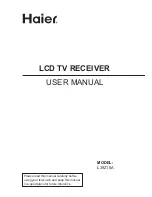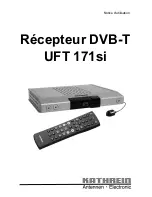
TOC1502NUbd_0418
3/4
TRI
0
2
SYS
sarl
–
8 grande rue le village, 21160 FLAVIGNEROT
1.1 Use
The 2 channel bidirectional din rail receiver
10020086
is used to receive radio signals
from switch transmitters, sensors or in communication with gateway (see compatibility table
§6.1). Associated as sensor (see §5.2) on BMS products, one can get an acknowledgment to
each change or an access to advanced functions such as radio test function (see §6.3). It is
used for switching loads, e.g. incandescent, halogen, fluorescent tubes, halogen lamps with TBT
ferromagnetic transformer and electronic, power contactor or small motors.
Before any use, the transmitters must be allocated to a receiver. Each sensor or transmitter can
control an unlimited number of receivers.
Note:
Read the operating manual carefully before initial use.
1.2 Guarantee terms
This operating manual is an integral part of the device and our guarantee terms. It must always
be delivered to the user. We reserve the right to modify the technical design of these devices
without warning. products are manufactured and their quality checked by making use
of the latest technologies and taking into account the applicable national and international
directives. If nevertheless a fault arises, undertakes to remedy the default as follows,
without prejudicing the rights of the end customer that arise from the sales contract with his
reseller.
If the event of exercising of a legitimate and regular right, , may at its sole discretion,
rectify the device fault or supply a fault-free device. Any claim beyond this and all claims for
consequential damages are excluded.
A legitimate fault exists if the device cannot be used at the time of delivery to the end customer
because of a design or manufacturing defect or if its practical use is severely limited. The
guarantee is void in cases of natural wear and tear, incorrect use, incorrect connection, where
the device has been repaired or external influence. The guarantee period is 24 months (from the
date of invoicing). French law applies to the regulation of guarantee rights.
1.3 Recycling of the device
To recycle the device, conform to the legislation and standards in force in the country of use.
WARNING! Risk of electric shocks! (See UTE C18-510) The device contains live
internal components. Risk of wounds or injuries if contact occurs! All work on
the mains supply network and the device must only be carried out by authorised
professional technicians.
• Before carrying out any work, switch-off and isolate the device.
• Secure the device to prevent it being switched back on.
• Check the device is in a zero-volts state.
• Carefully reclose the casing before reconnecting to mains power.
Observe the following points:
• The laws, standards and directives in force.
• Best practice at the time of installation.
• The device operating manual.
• An operating manual can only give general instructions. They must be interpreted in the context
of a specific installation.
The device is intended solely for use conforming to its purpose. Any repairs or modifications by
the user are forbidden! Do not use with other devices the operation of which could endanger
people, animals or property.
Remarque:
The signal strength between the transmitter and the receiver decreases as the
distance increases. Where there is a line of sight connection, the range is approximately 30m in
corridors and 100 m in large workshops or halls.
The range can be increased with a repeater
.
4.1 Safety instructions
The installation and initial use must only be performed by authorised qualified electricians. The
electrical installation must be placed off-load before connection it to the mains (230V~/50Hz).
Conform to the legislation and standards in force in the country of use.
4.2 Installation
• This product is designed for indoor use. It is maintenance free.
• This product is intended for installation only on horizontal DIN rail, in an electrical panel
(mounted on a vertical wall) with compulsory installation of a plastron which will be connected to
the ground of the installation if it is metallic.
• For compliance with the standard reference, height of the plastron (compared to the above DIN
rail) must not exceed 48mm with a minimum thickness of 1mm.
• NEVER install the receiver in a metal casing or in the immediate vicinity of large metallic
objects.
• Installation on the ground or close to the ground is not recommended. Thank you to refer to
the installation standards of each country.
• Protect the supply line with a circuit breaker
2A curve C
adapted to the installation place.
• For the controlled power over 400W for the entire receiver (the two channels), the output
contacts must be supplied with the same supply line as the product, but protected separately
with a 2 fuses
6A type gG
adapted to the installation place (1100W maximum by output).
Note
:
- the two
L
terminals are
Internally connected
- see section 6.2 for
Changeover of state/
operating
4.3 Initial use
• Connect power to the electrical installation after it has been installed.
• Program the transmitter on the receiver (see § 5), or as sensor (see §5.2) on BMS product or
diagnostic product (see §6.3).
For programming the receiver must be connected to the mains. The programming is conserved
during a power failure.
A small insulated screwdriver shall be used on the unit to activate the
LRN
or
CLR
buttons
.
5.1 Programming mode or transmitter deletion mode
N.B.!
A transmitter must not be further away than 5 m from receiver in learn mode. The
receiver has a limited range !
To enter the programming mode, short press (approximately 0,5s) the
LRN
button. This mode is
confirmed by the regular flashing of
LED 1
.
a) To select channel 2, short press (approximately 0,5s) the
LRN
button. This change is
confirmed by the stopping of
LED 1
and by the regular flashing of
LED 2
.
b) To associate a transmitter simply press on one of the switches or press the
LRN
button
(see §6.2). The receiver will acknowledge its recording in memory by maintaining the
LED
corresponding to the selected output on for 4 seconds. As soon as flashing LED starts again,
another transmitter can be associated or cleared.
c) To clear a transmitter simply press on one of the switches or press the
LRN
button of the
desired sensor (see §6.2). The receiver will acknowledge its clearing off the memory by
maintaining the
LED
corresponding to the selected output off for 4 seconds. As soon as flashing
LED starts again, another transmitter can be associated or cleared.
d) The transmitter association or deleting, may also be performed through the UTE
1
protocol
(Universal TEach-in) of EnOcean.
To exit programming mode, short press (approximately 0.5s) the
LRN
button. The output is
confirmed by the stopping of regular flashing of the
LED
.
Remarque:
– No transmitter is programmed in the receiver as supplied state.
– When using BMS products, mono or multi-channel, programming must be performed alone
and channel by channel: you must exit the programming mode between each channel, by short
press the
LRN
button and within 5 seconds after the start of
LED
acquittal.
– Up to 32 switch, transmitters and sensors can be allocated to each channel.
– If the memory is full, the receiver exits programming mode upon an additional association
attempt.
– The transmitters are alternatively programmed or cleared in the event of several activations!
– For transmitter of EEP 4BS type, a programming acknowledgment frame (4BS Teach-in
variation 3
1
) is always sent.
– If no button is pressed, learn mode stop automatically after 30 s.
5.2 Sensor mode
The receiver
10020086
once associated with a BMS product, transmits an
acknowledgment to each change of output state. In addition, advanced features such as
querying and change of remote state become available under the profil EEP D2-01-11
1
:
a) Enable on the BMS Product in the programming mode (see the instructions).
b) Short press (approximately 0,5s) the
LRN
button (product
10020086
) for send association
frames of UTE
1
type. These emissions, every 3 seconds are indicated by the regular flashing of
the
LED 1
until the exit of this mode by a short press (approximately 0.5s) on the
LRN
button;
the output is confirmed by the stopping of regular flashing of the
LED
.
c) The association with this BMS product is validated upon receipt of a positive response of
UTE
1
type. This is confirmed, on the receiver, by maintaining the
DEL 1
on for 4 seconds.
5.3 Clearing off all the programmed transmitters
Press the
CLR
button for approximately 2s. Clearing is confirmed by the regular flashing of
LED
1
. The receiver returns automatically to programming mode.
To exit programming mode, short press (approximately 0,5s) the
LRN
button. The output is
confirmed by the stopping of regular flashing of the
LED
.
1
frame description is described in the
EnOcean Equipment Profiles EEP2.6
document available
on :
www.enocean-alliance.org/en/enocean_standard
1. General
2. Safety
3. Technical characteristics
0
2
LINE
Degree of protection
IP20 with plastron
Range in buildings
Masonry
20m, through 3 walls at most
Reinforced concrete
10m, through 1 wall/ceiling at most
Plasterboard / wood
30m, through 5 walls at most
Transmission frequency
868,3 MHZ
Power supply
230V / 50 Hz
Ambient temperature
from -10°C to +45°C
Storage temperature
from -20°C to +80°C
Terminal capacity
1x1,5
2
à 2,5
2
max rigid
General characteristics
Output (zero potential)
2 contacts micro distance (µ) opening
contact with common, I
min
=100mA
max µ5A/1100VA resistive (cos
φ=1)
400W incandescent/halogen
150W inductive (cos φ= 0,4 à 0,6)
5. Programming
Installation altitude
2000m max.
4. Installation and initial use
7mm
Category receiver
2
Ambient humidity
from 0 to 75%hr (without condensation)
EnOcean Equipment Profile
D2-01-11
0
2
LINE
DEL display
Output status
Programming
CLR button
Cancels all
transmitters
LRN button
Learn mode
Connection drawing for a
lighting application
≤ 400W :
Connection drawing for a resistive
load application ≤ 1100W (by output) :
Output 1 and 2 :
- load disconnected when off
Gate C :
- power contacts
LN
: Mains
230V~ / 50 Hz
L
N
C2A
L
N
C2A
F 6A
Load
≤1100W
≤1100W
TRI
0
2
SYS
TRI
0
2
SYS
TRI
0
2
SYS
0
2
LINE
Installation and operating manual
2 channel 5A bidirectional din rail receiver
Réf.
10020086
EN






















